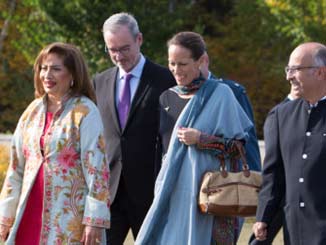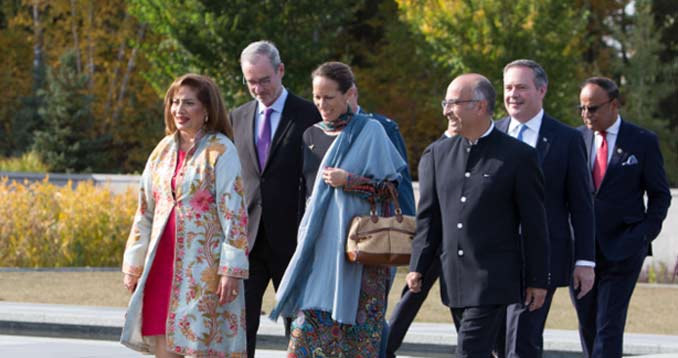

Premier of Alberta Jason Kenney welcomed guests to the event at Government House and paid tribute to the Ismaili Imam Aga Khan’s contributions to Canada in general and the province of Alberta in particular.
He also presented Princess Zahra Aga Khan with a Government Proclamation acknowledging 50 years of the significant presence of Ismaili Muslims in Alberta and Canada, and stated in his remarks that Canada has “benefitted incalculably from the contributions of the Ismaili community over these past five decades.”
Princess Zahra thanked the Province of Alberta for their partnership and support of the Ismaili community and Imamat institutions over the course of many years.
As far back as the 1980s, Alberta Aid supported education, health, and rural development initiatives of the Aga Khan Foundation, and in 2012, Alberta became the first province in Canada to sign an Agreement of Cooperation with the Ismaili Imamat.
“It is a privilege to be here with you today, and to express, on behalf of His Highness and the Ismaili community around the world, our gratitude for our permanent friendship,” said Princess Zahra. “Thank you Alberta, and thank you Canada, for creating such fertile ground for improving quality of life, not just for the Ismaili community, but for all peoples, regardless of their history, origin, or story,” she added.
A notable guest of honour at the luncheon was Alberta’s Lieutenant Governor Salma Lakhani, a member of the Ismaili Muslim Community from Edmonton, and a tireless champion of civic engagement. Lakhani is the first-ever Muslim to hold the position of Lieutenant Governor in Canada.
She spoke of the experience of moving to Canada as a child and living within its enabling environment. “Most of us have felt surrounded by the open arms and generosity of spirit, and resources of countless individuals in Canada who have supported us in our aspirations and reached out to us during our challenging times.” she said, before adding, “Just as today we feel a duty, as not so new Canadians, to reach out to others.”
Prince Rahim and Princess Zahra also represented the Aga Khan at a special ceremony in Vancouver to sign an Agreement of Cooperation between the Ismaili Imamat and the Province of British Columbia. The parties will work together to improve the quality of life of vulnerable individuals around the world, beginning by addressing growing global challenges around the environment and climate.
“The agreement reinforces the Imamat’s permanent commitment to this province, and, alongside similar partnerships already in place with Alberta and Ontario, to this great country,” said Prince Rahim in his remarks at the event, hosted along the waterfront in downtown Vancouver.
“First among the challenges and risks that face humanity today is the climate emergency in all its dimensions,” he added. “The recent devastating floods in Pakistan, for example, illustrate the urgency of the situation.”
“British Columbia has become a leader in the fight against planetary breakdown. Its institutions, companies, and organisations, public and private, are creating new knowledge and identifying innovative solutions in the areas of environmental stewardship, climate adaptation, sustainability, and many others.”
The partnership will facilitate the Aga Khan Agency for Habitat’s close collaboration with the Climate Action Secretariat of British Columbia to assess and tackle long-term environmental risks facing people in the mountains of South and Central Asia.
Premier of British Columbia John Horgan signed the agreement on behalf of the Province, shortly after meeting with Prince Rahim and Princess Zahra to discuss areas of mutual collaboration.
“Today we talked about the challenges of inequality, we talked about the challenges of climate change and the impact it has on civil society, on families, and individuals,” said Premier Horgan.
“Only by working together collectively, multilaterally, globally, can we address these challenges and what I’ve learnt in my time in getting to know the Ismaili community here in British Columbia is that all of us stand ready to take on that challenge.”
Soon after the ceremony, Janet Austin, Lieutenant Governor of British Columbia, hosted a luncheon in honour of the signing. “I’m so pleased to see this relationship developing and deepening, in terms of how we can help to address climate change and adapt for the future,” said Lieutenant Governor Austin. “This accord will surely deepen and endure over time, anchored as it is, in our vision for a better world for all, and our shared commitment to cooperation and mutual learning.”
She also paid tribute to the Ismaili community for playing a full part in the fabric of Canadian society and for making the country its home. “Thank you for all that you have contributed over the past 50 years and for all that we can accomplish together in the next 50,” she said.
Addressing guests at the luncheon, Princess Zahra applauded Canada for accepting Ismailis and other communities “with characteristic warmth, openness, and humanity” after they faced expulsion from East Africa 50 years ago. They were later joined by many others from all parts of the world.
“It would have been easier just to say no. But Canada welcomed those and other refugees with open arms and generosity,” she said to the assembled audience. “I believe that that has contributed to the rich tapestry that defines this country today.”
Princess Zahra also underlined the importance of a commitment to openness and equality of opportunity as the world faces increasing migration due to conflict, natural disasters, climate change, and poverty.
“Canada has shown that with clear intent, intelligent policy, considered leadership, and humility, it is possible to create the right conditions for people to flourish together,” she said. “It is my father’s wish, which I’m sure we all share, that the Ismaili community’s experiences here over the past five decades be an inspiration for other communities around the world.”

Leave a Reply